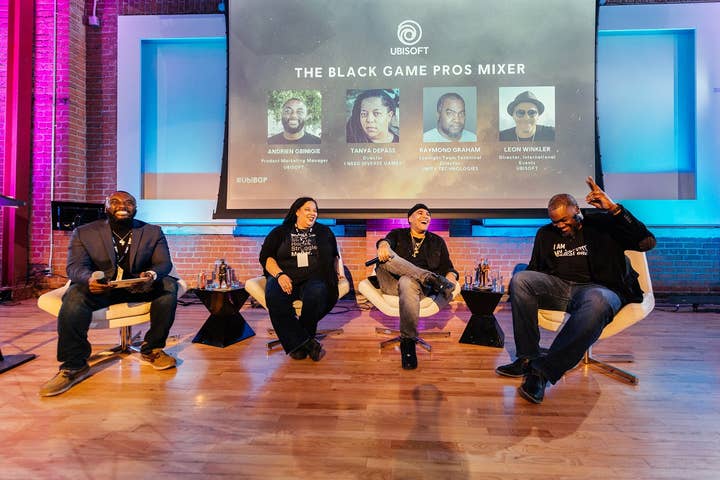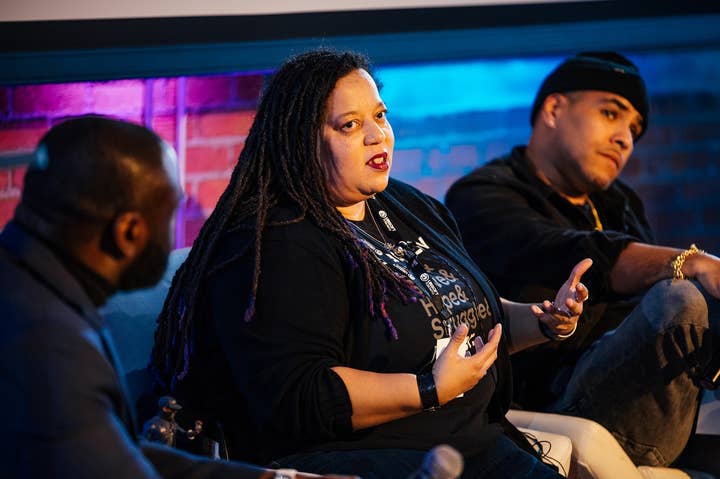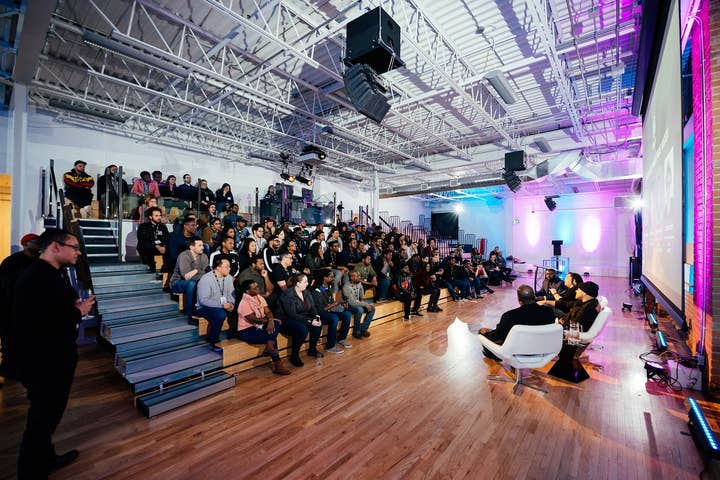Black game pros assess industry's diversity efforts
Panelists at Ubisoft Toronto event say they see progress but there's still a lot left to do
The industry has made significant progress on the diversity front, but there's still a long way to go. That was one of the takeaways from a panel discussion at Ubisoft Toronto's Black Game Pros mixer Thursday night.
The panel saw Unity technical director Raymond Graham, I Need Diverse Games founder and director Tanya DePass, and Ubisoft director of international events Leon Winkler fielding questions from the audience as well as the event's moderator, Ubisoft Toronto product marketing manager Andrien Gbinigie.
Gbinigie began the discussion asking about each panelist's decision to enter the game industry and if they thought of it as a risky profession.
"I'm Nigerian," Gbinigie explained. "And Nigerian parents are very particular about the professions you get into. You're either a doctor, a lawyer, or an accountant. And when I told my dad, he said, and I quote, "Ah ah! Is that not just a phase? What do you mean by video games?'"

DePass acknowledged her mother has no clue what she does, but parental pressure wasn't where she focused her answer.
"It was dangerous in the sense that I didn't get to see a lot of people like me," DePass said. "Like, I saw Andie [Gbinigie] and I saw other people. But I never thought I could be in this industry...
I'm very passionate about seeing people like me -- and like people in this audience -- in the games industry. But also seeing things like this. I don't get to see folks like us on the stage at E3 except for like the same five black people every year. Go ahead and laugh. But I knew it was a dangerous proposition because there's always someone who wants to gatekeep you and tell you that you don't belong, or wonder, 'What are you doing here? Why do you think you have a right to be here?' Well it's like, I got a college degree just like all these other dudes and the rest of the folks that want to keep me out or keep you out. And we belong."
"Diversity is as much getting people of diverse backgrounds into the room and at the table as it is the inclusion part: Making them feel like they have a voice and they're included and belong"
Andrien Gbinigie
Graham never thought of it as risky, but said he dealt with parental concerns as well. His mother was an engineer at IBM, and he had an offer to work with the company on user interfaces when he graduated college, but when he told her he was going to make games straight out of school, she thought he would be wasting his degree.
He noted that she became supportive eventually. He grew up in the Toronto area, but when he got his first job in Schaumburg, Illinois, his mother helped him move out there and talked with his new bosses "to make sure it was going to be OK."
Gbinigie then dove into one of the panel's biggest discussion points: diversity and inclusion.
"I'm probably preaching to the choir here," he said, "but a lot of the discourse surrounding diversity [and inclusion] is always focused on the 'D' part and not the 'I' part. Because diversity is as much getting people of diverse backgrounds into the room and at the table as it is the inclusion part: Making them feel like they have a voice and they're included and belong."
Specifically, Gbinigie wanted to know how the panelists assess the industry progress they've seen on that front.
"For me, it's when I go to an event I've been going to for a while, like PAX Unplugged... and seeing more people of color there that are running games, at booths, and speaking not just about diversity; it's about like making RPGs or things like that. When I go to events like GenCon or GDC even, it's not like the 'spot the few of us' game many of us get to play. Like, I can count more than 10 black people in one spot at one time. If you go to GDC for any number of times and you start counting, you'll notice an improvement. And whether that's through a program to get you there or you're in the industry and the studio sends you, you're seeing more and more faces like me and getting that head nod moment."

Winkler agreed there had been a definite increase in diversity at events.
"Indeed there's a slight increase of brown people and black people on-site," he said, "but still, nine out of 10 times it's people who want to get into the industry, but don't really know how."
Graham saw the growing presence of people of color at events as encouraging, but like Winkler said it's far from a "mission accomplished" moment for the industry.
"There is some increase [in diversity at events] happening, but I want to see it happening at a much faster rate. I want to see it in the actual studios. I want to see studios actually trying to recruit folks. That's where I think we're not meeting the need"
Raymond Graham
"I do see the increase at events like GDC," he said. "There is some increase happening, but I want to see it happening at a much faster rate. I want to see it in the actual studios. I want to see studios actually trying to recruit folks. That's where I think we're not meeting the need. It's like [companies are saying], 'I want the most capable bearded white guy to come and work here on my team,' and not, 'I want to go out and find a diverse set of folks.' We're not really putting the effort into that."
Winkler jumped on that point, saying, "I've had the same conversation with our top management. It's also the fact that they don't know where to look. If there's no diversity within these regions of top management, then nothing will change because then indeed they'll go for a 'me too.' Like, 'Oh yeah, I want the white guy with the beard. Or without the beard, I don't care.'
DePass added that companies looking for diverse candidates could also be setting themselves back in the language they use and how they post their jobs. At the same time, she stressed the need for people of color to put themselves forward for positions.
"The bearded white guy with all the confidence in the world will apply to something he has no business applying to or looking at, but someone like any one of us who has more than enough experience, more than enough confidence, but can't do literally everything on the 'this is also nice but not required' list, we'll talk ourselves out of a job real fast," DePass said. "And that's something we need to stop."
At this point, Winkler told an anecdote about how he got into the games industry. He'd previously been an events organizer, a DJ, and created a show for MTV in Holland, but things hadn't gone. He'd bankrupted his company, he was in debt, and looking for a job when he saw an Ubisoft product manager opening requiring a marketing degree, six years of experience, and a bunch of other qualifications he didn't have. But he applied anyway. He got an interview, after which they sent him an email saying they didn't think he was the right person for the job.
"But I had nothing to lose, so I was like, 'OK, I'll show you why I disagree with you,'" Winkler said. "So I sent him an email with like four pages of arguments for why I thought he was wrong. And now I'm here."

If employers are serious about wanting to make progress on the diversity and inclusion front, Graham said they need to have a diverse workforce first, and it has to be something they're willing to work for. Don't just go looking at MIT and Carnegie Mellon for new grads; send people to historically black Howard to recruit as well. Looking to open a new studio? Try opening it in a place more diverse than Copenhagen or Utah or Seattle.
"Stop accepting those crumbs of inclusion and go, 'Hey, you said you want to be diverse. But where's your CTO? Where are your other people that are folks of color, that are safe to be openly out and queer, that are safe to be openly out and trans?'"
Tanya DePass
"If you don't have somebody who's like the VP or director of diversity and inclusion talking straight to the CEO, being able to approve the budgets and push for that, the studio ain't serious about it," Graham said. "It has to start in these companies."
DePass added, "Stop accepting crumbs of diversity. Stop going, 'We got one white woman. We got one kinda sorta beige woman and we don't know what she is.' ...Stop accepting those crumbs of inclusion and go, 'Hey, you said you want to be diverse. But where's your CTO? Where are your other people that are folks of color, that are safe to be openly out and queer, that are safe to be openly out and trans?'"
And when a company does have an executive of diversity and inclusion, DePass said one of the best things people in the studio can do is support them and not let them fail.
"I've seen so many people come in as D&I folks and they're set up to fail because they didn't 'fix' diversity," she said. "If there aren't suddenly all these brown people flocking to their company, buying their games and using their products, then they have somehow failed when they didn't look at the culture of the company and start from within."
And for developers of color who do establish themselves in the industry, the panel implored them to use their success to help others. That's something that can take many forms; for example, Graham is a director at Game Heads, a free training program for low-income youth and youth of color in Oakland, California that prepares students for a career in tech and games. But one doesn't need to have achieved the same level of success before they begin supporting others; support can be as simple as backing developers of color on Patreon, Kickstarter or other such platforms. It can be referring recruiters to them when approached with a job offer that doesn't quite fit you. When in a position to hire, it can be finding someone new to the field -- and not just one's buddies, DePass notes -- for the role. DePass also suggested monetarily supporting small events and organizations like the Game Developers of Color Expo, Game Heads, or I Need Diverse Games.
Gbinigie wrapped the panel up by asking if now was a good time or a bad time to be a black person entering the games industry. DePass responded that it was both.
"If you just wait and sit back and wait for people to throw a job in your lap, it'll never happen. It's better to just go for it, take the chance, take a risk"
Leon Winkler
"On the one hand, there are more and more of us in this space, and depending on where you go, you're probably not going to be the only black person or brown person there. But on the other, there are still going to be angry bros that think you don't belong, and how dare you impinge on what they think is theirs. What I run into is what I call this idea of 'gamer manifest destiny.' These white dudes have surveyed, and because all the people they get to see who make the games look like them, they think that's all that matters.'"
There are a lot more brown and black people in games now, DePass said, so there are more networking opportunities, but there are still some in the community who would try to keep them out, and studios where they may be the only person of color on staff.
"Find your folks. Get out there and do it, but don't let what keeps you out of the industry be someone who thinks you don't belong. Because we're often our own worst enemies and a lot of people don't even try to apply for games jobs, or they think 'I've only shipped one title; there's no way they'd [hire me].'"
Winkler noted that Gbinigie got into games because he was a content creator making YouTube videos about Assassin's Creed. That caught the dev team's attention, who ultimately wound up bringing him on board.
"It's also the thing that you put in, you will get out of it. If you just wait and sit back and wait for people to throw a job in your lap, it'll never happen. It's better to just go for it, take the chance, take a risk. Maybe you'll fail, but if you never try, you'll never know."
